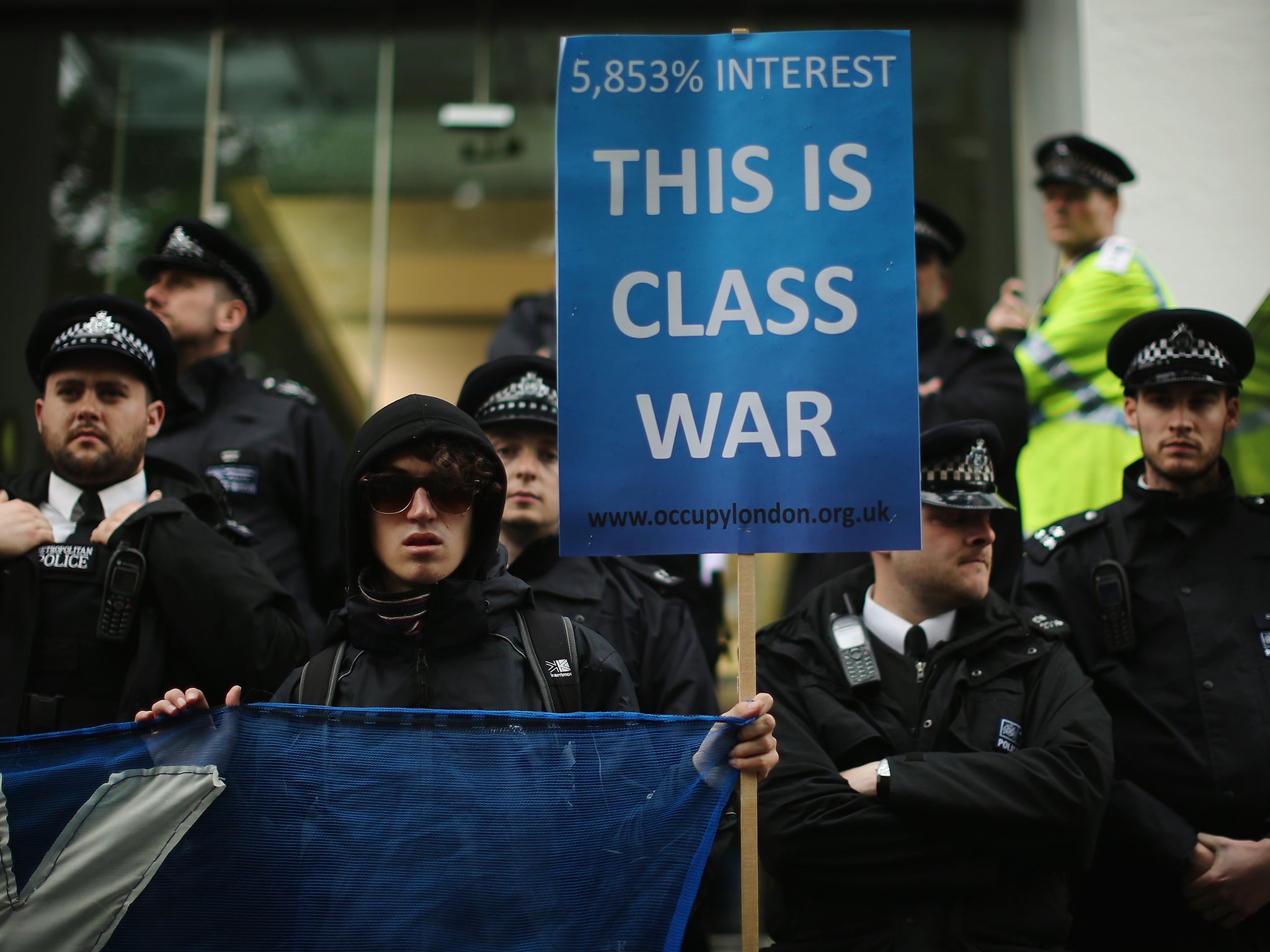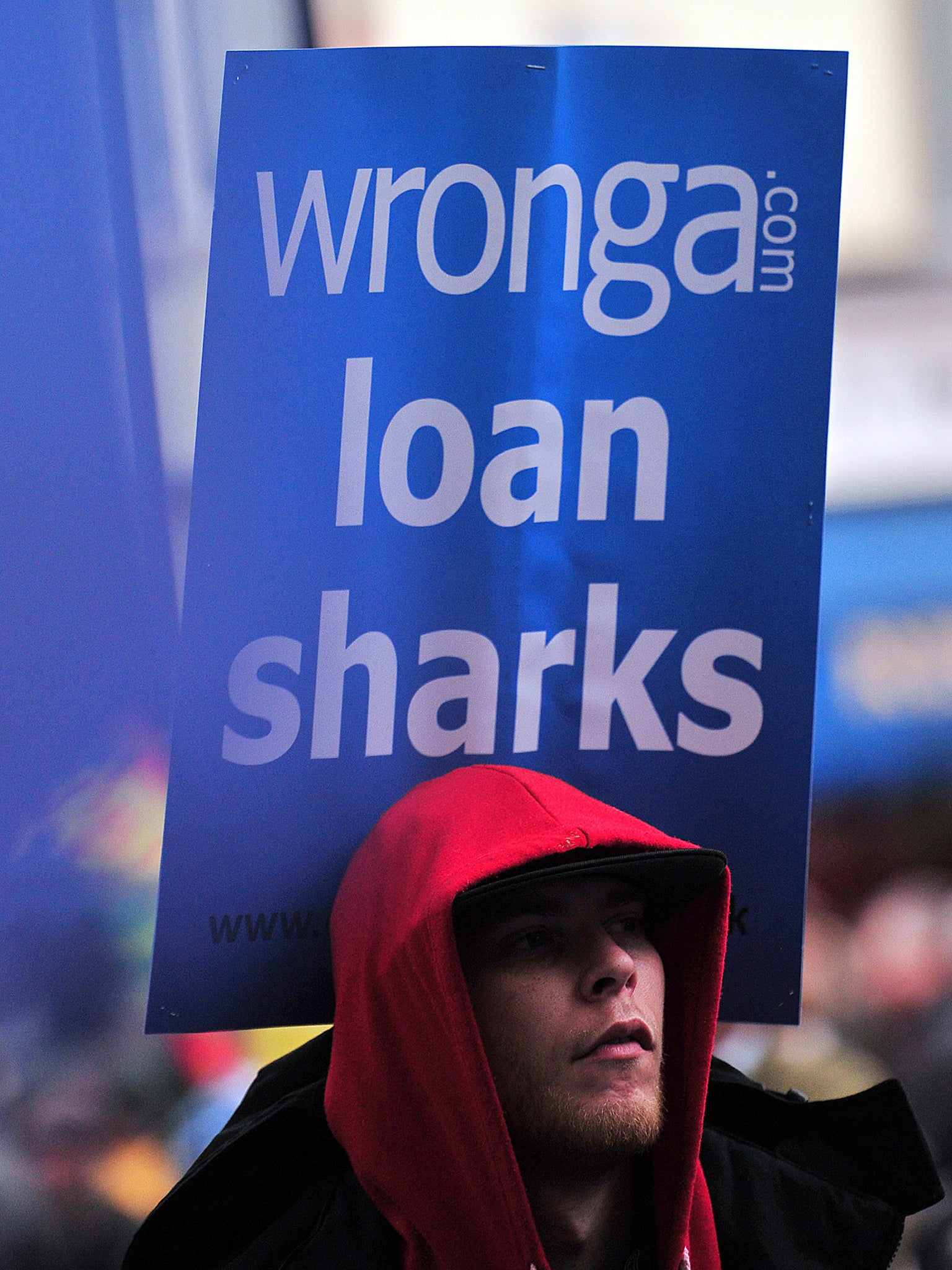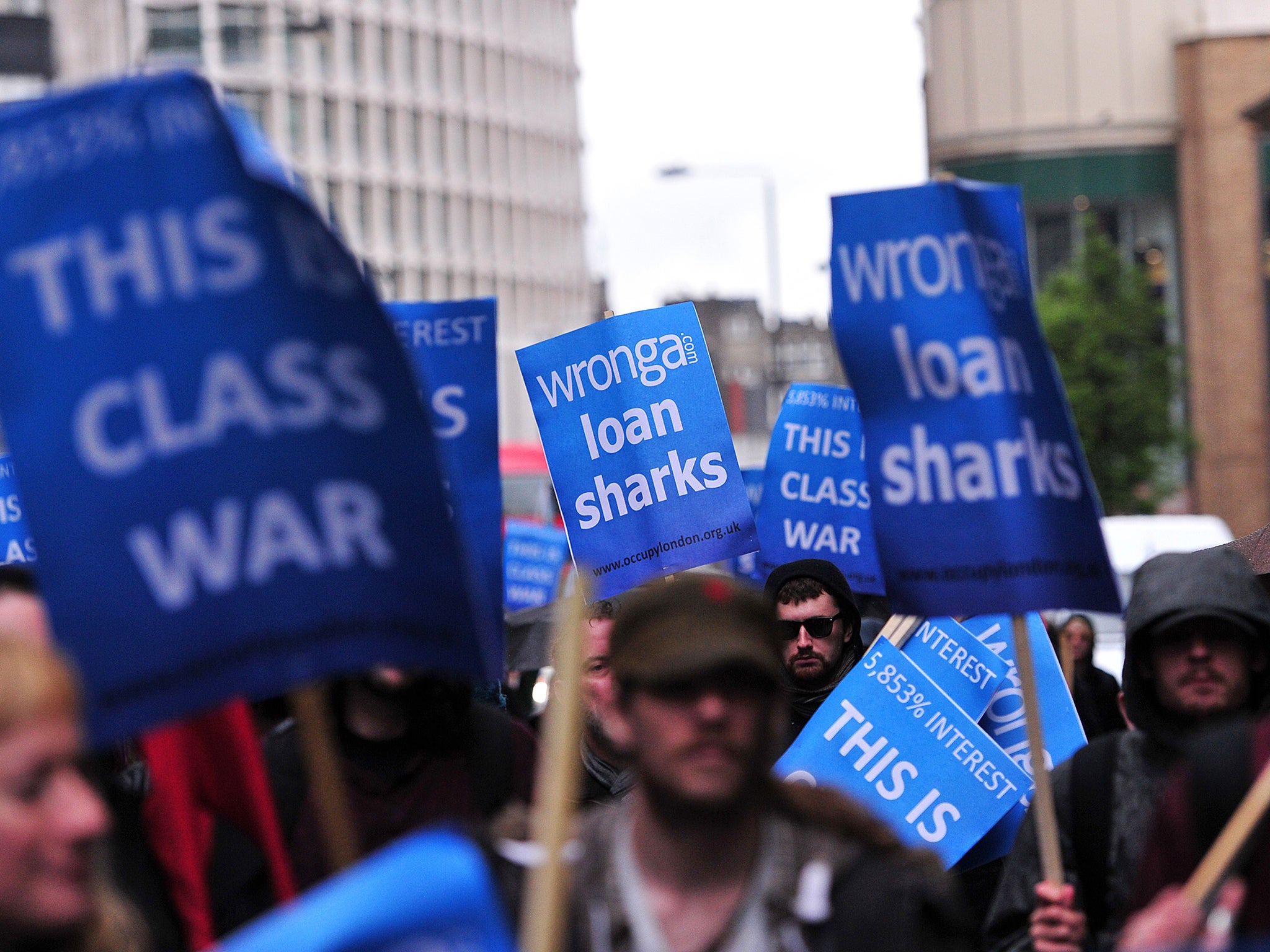Without financial regulation, payday loan scandals continue to hit the poorest the hardest
Would reform, asks James Moore, have taken as long were the scandal to have impacted on wealthier, noisier consumers, with better access to the media?


It’s the zombie company that’s reached out to torment its victims beyond the grave.
The name wonga.com is cursed by thousands of people that had dealings with a firm that tipped into administration before they had the chance to claim redress.
Their experience suggests that the answer to the question, “is Britain’s financial system failing the poor?” is yes. The same could be said of a related question: “Are financial scandals that affect those with low incomes and little influence handled with the same sort of vigour as those that impact upon middle-class people fortunate enough to have the means to save?”
MPs on the Treasury Committee railed against Wonga last month. More than 10,000 borrowers were awaiting rulings from the Financial Ombudsman when the payday lender collapsed.
They were advised by the Financial Conduct Authority (FCA) to contact the firm’s administrator. It was the equivalent of the watchdog saying, “Don’t look at us, we can’t help”.
Another, smaller, firm WageDay went down the same road in February when its owner, Curo Transatlantic, called in the administrators. They are currently in the process of contacting aggrieved borrowers. It says that they will get some money, so they should respond. But they will not get back the redress they are owed as a result of the company’s misdeeds.
Contrast this with the payment protection insurance (PPI) compensation train. It has been rolling for years, although an FCA imposed deadline for claims will finally bring it to an end in August.
Those who have benefited from it tend to be rather better off than Wonga borrowers. Credit card companies and other lenders that mis-sold PPI were, as a rule, more careful about whom they lent to than the likes of Wonga, preferring people with stable incomes and decent credit ratings.
The latter’s borrowers were, according to research by the FCA, poorer than average, and most (68 per cent) struggled to pay bills, having no savings and an average of nearly £5,000 in non-mortgage debt.
People with savings, or who buy insurance products like PPI, are usually well protected. If a provider goes to the wall while they are awaiting an ombudsman’s ruling on a compensation claim, the Financial Services Compensation Scheme will (in most cases) be there to pick up the pieces.
When the financial crisis struck, meanwhile, the government spent billions of pounds in taxpayers cash to ensure no one lost out as a result of their bank going pop. It had been spooked by people queueing for their money outside Northern Rock branches.
Savers with Farepak, most of whom, like Wonga borrowers, had only modest means, have every reason to feel bitter about that. The company went out of business in October 2006, shortly before the financial crisis, taking £37m of its 114,000 customers’ money with it and leaving them facing a cold Christmas.

There was a fierce debate about whether the company’s directors or its bankers at HBOS were most to blame for the debacle. It was academic to the victims, who ultimately had to wait years to get back less than half of what they were owed from the company’s liquidators.
Incredibly, commercial Christmas clubs, like the one operated by Farepak, are still unregulated.
Ten years after the scandal, the Law Commission warned it could easily be repeated in a report into retail insolvency (there’s a lot of it about right now) and its effects on consumers. As well as calling for more protection for those who pay up front for goods that retailers don’t deliver when they go bust, it recommended regulation for “Christmas and similar savings schemes, which pose a particular risk to vulnerable consumers”.
A fine idea. It took 17 months for the government to respond, and while the Department for Business, Energy and Industrial Strategy said it planned to consult, and bring forward legislation, we are still waiting for it to arrive.
It isn’t hard to see what’s getting in the way (cough, Brexit). In the meantime, there is a voluntary code of practice, but not all schemes are members.
Would reform have taken as long were the scandal to have impacted on wealthier, noisier consumers, with better access to the media?
Wanda Wyporska thinks not. The chief executive of the Equality Commission says: “It seems that it’s easy to rip off poor people, but harder to get away with scamming those who have been able to save. While it’s always a disaster when savings schemes and businesses go under, both for staff and customers, it’s clear that this is another area of poverty premium. it shouldn’t cost more to be poor.”
The poverty premium she refers to sees poor people paying extra for a myriad of services, and financial services in particular. Just for fun, I put my details into a price comparison site to find out how much it would cost me to borrow £1,000 for a year. The cheapest quote came out at just £1,080. I then looked at a well-known payday lender. It would charge you nearly 10 times that to borrow the same amount for just three months. Prior to the FCA imposing a cap on what lenders can charge, it would have been a lot more than that.
James Daley, the managing director of Fairer Finance, a research and ratings agency that aims to help consumers make more informed decisions when buying financial products, says financial scandals have a huge impact on all sections of society, but inevitably hurt the poorest most because of their lack of resources.
“Financial scandals tend to hit the poorest hardest because of the simple fact they have less money. So any kind of loss is going to be felt harder. Because lower income households tend to have lower levels of financial capability they are ultimately more vulnerable,” he says.
“Nevertheless, in nominal terms, it’s probably middle-income families who suffer the biggest losses. Any losses that happen as a result of investment mis-selling, for example, are not likely to be felt by the poorest as they are very unlikely to have funds to invest in the first place. But for middle-income families who do find themselves caught up in investment mis-selling or bank fraud, the losses can run to tens or even hundreds of thousands of pounds. That can be truly life-changing for those involved.”
That’s a fair point.
Most of those hit by the huge HBOS bank fraud in the Thames Valley region, or who had businesses that were sent to Royal Bank of Scotland’s Global Restructuring Group for distressed borrowers, were better off than the average Wonga borrower, or Farepak saver, at least before getting caught up in those scandals.
But they still had to fight tooth and nail to receive compensation. The processes set up to handle payments, overseen by the respective banks, also came in for a lot of criticism.

Daley, meanwhile, points out that the FCA has been actively working on issues such as financial exclusion, and the way vulnerable borrowers are treated.
“The FCA continues its work on vulnerability and reminds companies that lower-income families are more likely to be vulnerable. But there’s plenty of people who fall through the gaps,” he says.
“Farepak was completely unregulated. Funeral plans remain unregulated. Gift cards are not regulated. The losses from these products tend to hit the poorest hardest. The onus is probably on the government to try harder in these areas, and to give the regulators the powers to work in them.”
That point highlights the limitations the FCA faces. Its remit is set by parliament. However, it has proved in the past that it has the ability to interpret it with a degree of creativity. It imposed heavy fines on the banks involved in the foreign exchange trading and Libor interest rate fixing scandals, for example, even though the forex market was unregulated as was the process used to set Libor.
The work on financial exclusion and the issues facing disadvantaged consumers has yielded some notable results. The cap on what payday lenders can charge was recently extended to cover rent to own retailers, for example.
But Daley’s concerns about gaps are shared by Citizens Advice, which typically finds itself at the sharp end when people find themselves at the wrong end of the financial system.
The organisation highlights how it isn’t just big ticket scandals involving blatant wrongdoing that haunt disadvantaged groups. Those gaps are allowing some very real day-to-day problems to fester than might be seen as scandals were they given sufficient attention.
Principal policy manager Joe Lane says: “The [payday loan] caps are good where they’re used, but some types of loans aren’t covered, such as doorstep lending. It’s one of the most common forms of high-cost credit problem we see and leads to debt spirals because people often repeat borrow to keep up with repayments.
“There is also the loyalty penalty, which is where customers are penalised for simply being loyal to their provider. We’ve found this occurs in the mobile phone, broadband, home insurance, mortgage and savings markets and our research shows it’s vulnerable people who are more likely to pay this penalty. There’s not been enough done by regulators to stop people being ripped off, which is why we made our super-complaint to the Competition and Markets Authority (CMA).
“The CMA has now given a six-month deadline for regulators to come up with a plan for how they are going to end the loyalty penalty. It said nothing should be off the table. That deadline’s in June, and the clock’s ticking. We expect to see regulators take bold action to stop loyal customers being taken advantage of.”
It isn’t just businesses that are causing problems. Lane points to the way government, both central and local, handles debt collection, and in particular its fondness calling in bailiffs. Their activities are not independently regulated and their charges are born by the debtor.
Asked if that means low-income groups are dealt with more harshly than those in better circumstances Lane says: “Yes, and the treatment of people who get into difficulty is unfair. The emphasis seems to be on punishing people rather than helping them get back on track.
“Bailiff fees can typically be £300, and people will often end up borrowing either via credit cards or a loan to pay that, further trapping them in the spiral of debt. We want bailiffs to be independently regulated so they collect debts in a fairer way. Government should help people repay their debts in a sustainable way rather than pushing them further into debt through harsh collection practices.”
Fran Boait, executive director at Positive Money, which campaigns for a fairer financial system, thinks things might be better if there were more people who had lived with, or grown up in, tough circumstances working at regulators overseeing the financial system.
“Those responsible for overseeing the behaviour of lenders at regulators such as the Bank of England and the FCA are usually appointed after careers in the financial sector,” she says.
“Often coming from privileged backgrounds, these officials are unlikely to have experienced relying on payday loans and other forms of high-cost credit, and may have little idea of the suffering caused by the behaviour of firms like Wonga.”
Boait adds: “It is important that we increase diversity among financial policymakers, not just in terms of gender and race, but also professional backgrounds. Appointees who understand the full-breadth of life in Britain will be better placed to make decisions in the wider public interest.”
Whether or not there is bias against the poor, scandals, as Daley notes, inevitably hit the poorest hardest.
It is an issue that urgently needs to be addressed.
Join our commenting forum
Join thought-provoking conversations, follow other Independent readers and see their replies
Comments